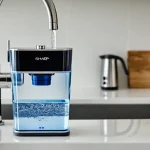Essential Factors for Choosing Home Water Filtration Systems in the UK
Selecting the right water filtration systems UK involves understanding the unique characteristics of local water supplies. UK water often contains specific contaminants such as chlorine, hard minerals, and sometimes traces of pesticides, which necessitates choosing a filter that targets these impurities effectively.
When choosing water filter systems, consider three primary factors: the type and level of contaminants in your water, the size of your household, and your current water supply infrastructure. For example, larger families typically require a system with higher capacity or faster flow rates, while homes with hard water benefit from filters that reduce limescale.
This might interest you : How can UK families personalize their home interiors on a budget?
Motivations for installing home water treatment devices frequently include concerns about health, improving the taste and odor of tap water, and protecting appliances like kettles and washing machines from damage caused by mineral build-up. Understanding these drivers ensures you select a system tailored to your specific needs, improving water quality effectively and economically.
Understanding UK Water Quality and Contaminant Concerns
Water quality in the UK can vary significantly based on regional differences, particularly in terms of hardness and common contaminants. For example, areas in southern England often experience harder water, rich in minerals like calcium and magnesium, leading to higher levels of limescale buildup. In contrast, parts of Scotland and Wales tend to have softer water with lower mineral content.
Topic to read : How can UK homeowners choose the best water filtration systems?
Among the most prevalent water contaminants in the UK are chlorine, used widely to disinfect water supplies, and trace amounts of heavy metals such as lead and copper, which can enter water through outdated pipes. Chlorine, while effective for sanitation, may affect the taste and smell of tap water, and prolonged ingestion at high levels raises health concerns. Limescale, on the other hand, primarily affects appliances and plumbing rather than posing direct health risks but can influence water’s aesthetic qualities and flow efficiency.
To evaluate the safety and quality of your local water supply, it is important to access your local water quality report. These reports provide detailed information about any contaminants present, including levels of chlorine, heavy metals, and hardness measures. Water companies in the UK mandate regular testing and publish this data annually, allowing residents to make informed decisions regarding water treatment options for their homes. Understanding these factors equips consumers to better address concerns such as chlorine removal and limescale prevention, ensuring water that is both safe and pleasant to use.
Comparing Popular Water Filtration Technologies for UK Homes
Understanding key filtration methods and their suitability
When choosing between reverse osmosis UK, activated carbon filters, and UV filtration, it’s crucial to assess their effectiveness against common UK water contaminants and household needs.
Reverse osmosis (RO) systems excel at removing dissolved solids, heavy metals like lead, and nitrates, making them ideal for areas with hard water or industrial pollutants. Their fine membrane filters out up to 99% of contaminants but may waste some water during the process. RO systems also soften water, which benefits plumbing longevity but requires regular maintenance to prevent membrane clogging.
Activated carbon filters shine at eliminating chlorine, volatile organic compounds (VOCs), and improving taste and odour. They work through adsorption, trapping chemicals within porous carbon granules. While carbon filters don’t remove dissolved salts or pathogens, their affordability and ease of installation suit many British homes where chlorine is a primary concern.
UV filtration offers a chemical-free method to neutralise bacteria and viruses by exposing water to ultraviolet light. It’s highly effective for microbiological safety but doesn’t remove chemical pollutants or particulates. This tech is often combined with carbon or RO systems to create comprehensive filtration solutions for UK households.
Each filter type has trade-offs. Reverse osmosis gives thorough purification at a higher initial and upkeep cost, whereas activated carbon filters provide targeted chemical removal more economically. UV systems deliver pathogen control without chemical additives but rely on pre-filtered water for optimum performance.
Choosing the right system depends on water quality, budget, and maintenance capacity. UK residents can benefit from combining technologies, such as pairing activated carbon with UV filtration, to address a broad spectrum of contaminants efficiently.
Factors Influencing the Best System Choice for UK Residents
Choosing the best water filter UK depends heavily on several practical factors that align with individual needs and household conditions. First, budget considerations play a crucial role. Prospective buyers need to weigh not only the upfront cost of purchasing a filter but also ongoing expenses such as cartridge replacements and potential servicing fees. For instance, some filters have affordable initial prices but require frequent, costly replacements, which may push the overall cost higher over time.
Another important aspect is the ease of installation. UK residents often look for filter systems that fit seamlessly into their existing plumbing without requiring extensive modifications. Space constraints in typical UK homes can influence this decision, making compact or under-sink models preferable for many. Compatibility with standard UK plumbing fixtures ensures a smoother installation process and reduces the need for professional assistance.
Maintenance is also a key factor. Filters with straightforward replacement schedules and easily available cartridges tend to be more convenient. Some systems require filter changes every few months, while others may last over a year, meaning less frequent maintenance. Understanding the filter’s lifespan and how simple it is to access replacement parts helps buyers make informed decisions and maintain high water quality consistently.
In summary, selecting the right water filter involves balancing budget, installation ease, and maintenance demands to find a system that best fits UK households’ unique requirements.
UK Regulations and Certification Standards for Water Filtration
Understanding UK water filter regulations is essential to ensure that water filtration products meet strict safety and performance criteria. One of the most important markers of compliance in the UK is WRAS approval. This certification confirms that a water filter is suitable for use with potable water and complies with the British plumbing regulations. WRAS approval involves rigorous testing to verify that the materials used do not contaminate water and that the filter functions as claimed.
Beyond WRAS, many filters seek additional third-party certification to guarantee safety and effectiveness. Independent organizations, such as NSF International, issue certifications based on standards like NSF/ANSI, which cover various aspects including contaminant reduction and structural integrity. These standards help consumers identify filters that have been objectively assessed, boosting confidence in the product’s water purification capabilities.
Certification for water filtration often involves multiple layers of testing. This includes proving that filters remove specific contaminants without releasing harmful byproducts. Meeting these standards is particularly crucial in the UK, where water quality expectations are high and regulatory bodies require thorough compliance. By choosing filters with recognized certifications, users avoid potential health risks and ensure consistent water quality performance.
Assessing Individual Water Filtration Needs and Getting Expert Advice
Understanding your household’s water quality is the first step in choosing the right filtration system. Simple water testing UK services provide an accessible way to identify common issues such as hardness, chlorine levels, or contaminants. These tests typically involve sending a water sample to a laboratory, where experts analyze its composition and deliver a detailed report. This process offers a practical starting point for anyone uncertain about their water’s condition.
When results highlight specific challenges—or if water issues persist despite basic solutions—it’s wise to seek professional water filter advice. Qualified water quality specialists and experienced plumbers can assess complex factors like microbial content or pipe integrity, which simple tests might miss. Their insights ensure that your filtration strategy addresses all concerns effectively, preventing costly trial and error.
A useful approach is to conduct a personal water needs assessment alongside professional input. Consider factors like household size, types of faucets, and daily water usage. Create a checklist of filtration features you require—such as ultraviolet sterilisation, carbon filters for taste improvement, or softening agents for hard water. Matching these features to your unique needs guarantees a more satisfactory and efficient water filtration system tailored for your home.




